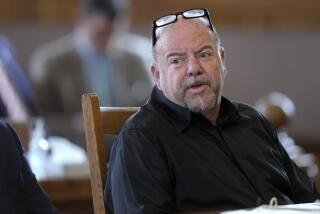Net Phone Firm Expected to Win Fee Exemption
- Share via
WASHINGTON — Despite concerns expressed by law enforcement officials about the timing, the Federal Communications Commission is poised to start making good on Chairman Michael K. Powell’s vow to keep regulators’ hands off Internet phone calls.
The FCC gave notice Thursday that it planned to decide whether Melville, N.Y.-based Free World Dialup can send voice calls over the Internet without paying local phone companies millions of dollars in routing fees.
Sources said the agency was expected to rule at its Feb. 12 meeting that the company, which claims 150,000 users, did not have to follow traditional federal rules because its Internet-based service largely circumvents the public phone system.
Free World Dialup’s request is part of the FCC’s wider examination of Internet telephony, which phone companies -- from giants such as AT&T; Corp. to start-ups such as Vonage Inc. -- are rolling out to reduce the cost of calls.
The technology chops conversations into packets of data and dispatches them, like e-mail, over the Internet. Before they reach their destination, the data are reassembled into speech.
Although Internet telephony transmits only a tiny fraction of current calls, it’s viewed by many as the next frontier in the $300-billion phone industry. Big carriers can use the technology to route traffic more efficiently and cheaply, but smaller carriers and even individuals can just as easily use it to bypass traditional phone companies altogether.
That worries law enforcement authorities, who may not be able to tap Internet conversations the way they do conventional phone calls -- in part because the law does not set clear standards for Internet telephony.
In a letter last week, FBI Deputy General Counsel Patrick W. Kelley asked the FCC to delay considering any Internet telephony issues until rules for official eavesdropping on calls were established. Kelley was writing on behalf of the FBI, the Drug Enforcement Administration and the Justice Department.
In response, the FCC promised to write new wiretap rules for the new technology, though not at the expense of moving ahead with other parts of its Internet telephony agenda. The agency wants to establish rules governing Internet phone calls by the end of the year.
Although it didn’t get exactly what it wanted, the Justice Department this week withdrew its much of its opposition.
“While it would obviously be our preference that the FCC decide these [wiretap] issues prior to considering other [Internet telephony] ... proceedings, we recognize that this is not practical, and have no desire to prevent the FCC from doing its work,” Deputy Assistant Atty. Gen. John Malcolm wrote.
Internet telephony takes many forms. At its most basic, computer users can place free Internet calls to others with the same software. More sophisticated offerings use special phones that can make calls to -- or receive calls from -- any phone number. And big phone companies use the technology to alleviate traffic on their regular networks.
Analysts said the FCC’s consideration of Free World Dialup’s petition was the clearest sign yet that Powell intended to deliver on his promise to shake up the telecommunications industry by allowing low-cost Internet telephone calls to flourish.
“This is the first marker that Internet telephony is to be a minimally regulated voice space,” said Scott C. Cleland, a telecommunications analyst for the Precursor Group, a Washington research firm. “This is the most overt action the commission has taken” on Internet telephony, which is also referred to as voice over Internet protocol, or VoIP.
In a speech last month, Chairman Michael Powell warned against excessive regulation.
“Regulation can smother the risk-taking oxygen young entrepreneurs need to survive,” Powell said. “It can weigh down innovation with forms and filings and drain capital by adding significantly to the cost of service. And the cost of government compliance is higher and you get less competitive prices for consumers.”
Jeff Pulver, who founded Free World Dialup in 2002, said he was cautiously optimistic that the FCC would give the green light to Free World Dialup. “Since we made it to the FCC agenda, my hope is that they will give their approval to my petition request,” Pulver said. But, he added, “It ain’t over till it’s over.”
Free World Dialup had asked the FCC that it be treated as a so-called information service so that its customers’ Internet conversations would not be subject to the fees placed on calls routed over the traditional phone network.
Because most of Free World Dialup’s customers use computers -- outfitted with microphones and speakers -- to converse with others, the FCC’s telephone division staff agreed with the company’s view.






